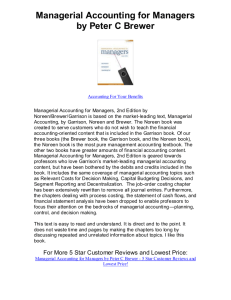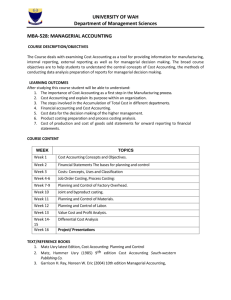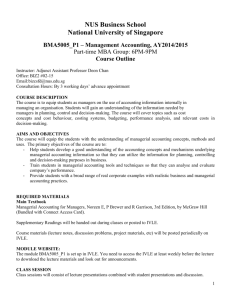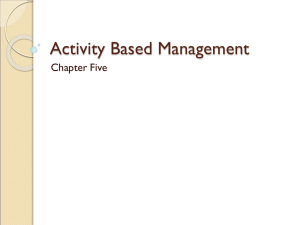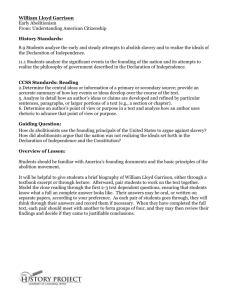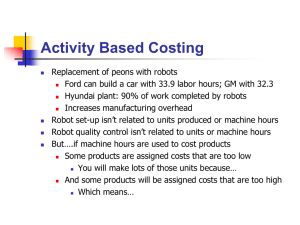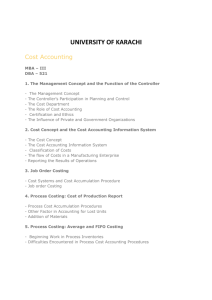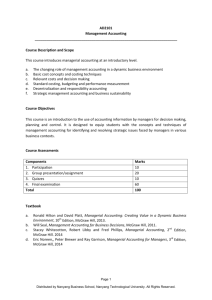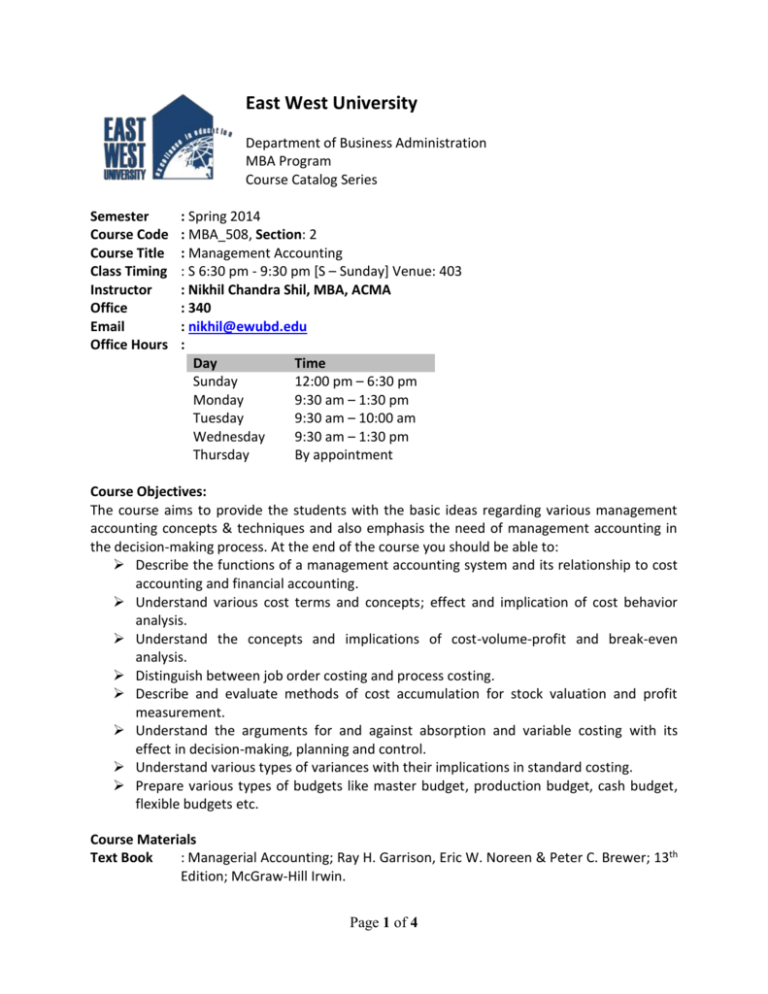
East West University
Department of Business Administration
MBA Program
Course Catalog Series
Semester
Course Code
Course Title
Class Timing
Instructor
Office
Email
Office Hours
: Spring 2014
: MBA_508, Section: 2
: Management Accounting
: S 6:30 pm - 9:30 pm [S – Sunday] Venue: 403
: Nikhil Chandra Shil, MBA, ACMA
: 340
: nikhil@ewubd.edu
:
Day
Time
Sunday
12:00 pm – 6:30 pm
Monday
9:30 am – 1:30 pm
Tuesday
9:30 am – 10:00 am
Wednesday
9:30 am – 1:30 pm
Thursday
By appointment
Course Objectives:
The course aims to provide the students with the basic ideas regarding various management
accounting concepts & techniques and also emphasis the need of management accounting in
the decision-making process. At the end of the course you should be able to:
Describe the functions of a management accounting system and its relationship to cost
accounting and financial accounting.
Understand various cost terms and concepts; effect and implication of cost behavior
analysis.
Understand the concepts and implications of cost-volume-profit and break-even
analysis.
Distinguish between job order costing and process costing.
Describe and evaluate methods of cost accumulation for stock valuation and profit
measurement.
Understand the arguments for and against absorption and variable costing with its
effect in decision-making, planning and control.
Understand various types of variances with their implications in standard costing.
Prepare various types of budgets like master budget, production budget, cash budget,
flexible budgets etc.
Course Materials
Text Book
: Managerial Accounting; Ray H. Garrison, Eric W. Noreen & Peter C. Brewer; 13th
Edition; McGraw-Hill Irwin.
Page 1 of 4
Reference Books:
1. Introduction to Management Accounting; Charles T. Horngren, Gary L.
Sundem & William O. Stratton, 13th Edition, Pearson / Prentice Hall.
2. Any other standard managerial accounting books available in EWU library.
Policy for missed classes, quizzes and midterm examination:
Students are requested to attend all the classes and to read assigned textual materials prior to
attending the classes. A student missing a significant number of classes without any valid
reasons may be dropped from the course. No make up would be allowed for missed quizzes.
Make up of midterm examinations will only be allowed if it is permitted by the Chairperson of
the Department. But, the student should sit for the make-up exam within one week of the
respective exam date.
Code of Conduct for the Students:
1. Students are expected to enter into the classroom within stipulated time.
2. Students must bring the required textbook, calculator and other logistics in the class.
3. Students should maintain the standard class environment. In this regard, activities like
side talks, use of cellular phones, frequent in and out from the classroom are strictly
prohibited.
4. Students found in any kind of unfair means in the exams will automatically be dropped
from the course.
5. Students must abide by all the rules & Regulations of the institution to be allowed to be
present in the class / exam halls.
Evaluation: Students will be evaluated as per the university guidelines. A tentative marks
breakdown is given in the table below. There will be minimum 3 class tests, may be announced
or unannounced. Best 2 will be averaged to calculate the marks for class tests. Assignments will
be announced by the faculty in due time, may be group or individual. Regularity and active
participation in the class is highly expected and solicited.
GRADING POLICY
MARKS DISTRIBUTION
A+
97 & above
Midterm examination 1
20%
A
90- below 97
Midterm examination 2
25%
A87- below 90
Final examination
30%
B+
83- below 87
Class quizzes
15%
B
80- below 83
Attendance and Participation
05%
B77-below 80
Home assignments
05%
C+
73-below77
Total
100%
C
70-below 73
Note: Respective weightage of marks
C67-below 70
may be modified by the instructor to
D+
63-below 67
make the assessment more competitive
D
60-below63
and participative.
F
Below 60
Grading Policy
University grading policy is applicable as shown in the table above.
Page 2 of 4
L E C T U R E
Lecture
P L A N
Details
Introduction: Definition and importance of management
accounting; comparison of financial accounting and
1
management accounting; expanding role of management
accounting in changing business environment – Lean
Production, Theory of Constraints and Six Sigma, The
Sarbanes-Oxley Act of 2002.
Cost terms, concepts, and classifications: General cost
classifications; product costs vs. period costs; cost
2
classifications on financial statements; schedule of cost of
goods manufactured; mathematical problems regarding
identification of costs.
Cost terms, concepts, and classifications: Cost
3
classification for predicting cost behavior, assigning costs
to cost object, decision making; mathematical problems.
Cost behavior analysis and use: Cost behavior and its
pattern; types of variable and fixed costs; fixed costs and
4
relevant range; mixed cost – segregation of mixed cost
into variable and fixed portion; contribution format
income statement.
Cost behavior analysis and use: Mathematical problems
5
regarding segregation of mixed costs; cost analysis;
preparing contribution format income statement.
6, 7 & 8 Cost-volume-profit analysis: C/M ratio; assumptions of
CVP analysis; application of CVP concepts; break-even
analysis; target profit analysis; the margin of safety;
Degree of Operating Leverage.
Mid Term Examination – 1
Variable Costing: Absorption costing and variable costing;
9 & 10 income comparison of absorption costing and variable
costing; effect of changes in production on net income;
Profit Planning: The basic framework of budgeting; the
11, 12 & self imposed budget; the matter of human relations; the
13
budget committee; the master budget; zero-based
budgeting.
Standard Costing: Management by exception; setting
standard costs; advantages and disadvantages of using
14, 15 & standard costs; balanced score card; direct material
16
standards; direct labor standards; variable manufacturing
overhead standards; variance analysis.
Page 3 of 4
Reference
Garrison & Noreen
Ch – 1
Garrison & Noreen
Ch – 2
Garrison & Noreen
Ch – 2
Garrison & Noreen
Ch – 5
Garrison & Noreen
Ch – 5
Garrison & Noreen
Ch – 6
Garrison & Noreen
Ch – 7
Garrison & Noreen
Ch – 9
Garrison & Noreen
Ch – 10
17
18
19 & 20
21
22
23 & 24
Mid Term Examination – 2
Flexible Budgeting: Flexible and static budget; flexible
budget in performance evaluation; fixed overhead
analysis; mathematical problems relating to preparing
flexible budgets and overhead analysis.
Flexible Budgeting: Mathematical problems relating to
preparing flexible budgets and overhead analysis; review
for second mid term examination.
Job-order Costing: Process and job-order costing; job cost
sheet; application of manufacturing overhead;
predetermined rate; under applied and over applied
overhead; disposition of under or over applied overhead;
Relevant Costs for Decision Making: Identifying Relevant
Costs, The make or Buy Decision, Mathematical problems
relating to relevant costing
Relevant Costs for Decision Making: Sell or process
further, special order
Process Costing: Comparison of job-order and process
costing; equivalent units of production; production report
under weighted average method and FIFO method.
Final Examination
Garrison & Noreen
Ch – 11
Garrison & Noreen
Ch – 11
Garrison & Noreen
Ch - 3
Garrison & Noreen
Ch - 13
Garrison & Noreen
Ch - 13
Garrison & Noreen
Ch - 4
Class work, Homework & Assignments:
In addition to theoretical discussions, a number of mathematical problems will be solved in the
class. Homework should be brought in the class timely in a separate workbook. Students will
have to submit individual/group assignments on specific topics as announced by the course
instructor in this regard within the specific time. Marks will be deducted for late submission of
assignments.
Nikhil Chandra Shil
Assistant Professor
Department of Business Administration
East West University
Page 4 of 4

